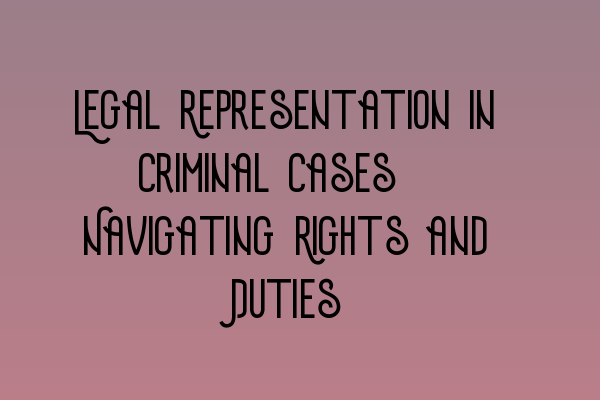Legal Representation in Criminal Cases: Navigating Rights and Duties
When it comes to criminal cases, legal representation is crucial in ensuring a fair trial and upholding the principles of justice. Lawyers play a vital role in safeguarding the rights of individuals accused of criminal offenses and guiding them through the complex legal process. In this article, we will explore the importance of legal representation in criminal cases, the rights of defendants, and the duties of solicitors.
The Importance of Legal Representation
Having a competent and experienced solicitor by your side can make a world of difference in a criminal case. Criminal law is a complex field, requiring in-depth knowledge and an understanding of the legal procedures and processes. A skilled solicitor can assess the evidence, advise you on potential defenses, negotiate plea bargains, and represent you effectively in court.
Furthermore, legal representation ensures that your rights are protected throughout the legal proceedings. Defendants have the right to a fair trial, the presumption of innocence, and the right to remain silent. A solicitor can help navigate these rights, ensuring that you are not unjustly convicted or unfairly treated.
It is important to remember that legal representation is not solely reserved for those who are guilty. Innocent individuals can also benefit from solicitors who can investigate the case, gather evidence, and present a strong defense to prove their innocence.
Rights of Defendants in Criminal Cases
Defendants in criminal cases have several rights that are protected under the law. These rights are essential for maintaining a fair and just legal system. Some of the key rights include:
- Right to Legal Representation: Defendants have the right to be represented by a solicitor. If they cannot afford one, legal aid may be provided.
- Presumption of Innocence: Defendants are presumed innocent until proven guilty. The burden of proof lies with the prosecution.
- Right to Silence: Defendants have the right to remain silent and cannot be compelled to testify against themselves.
- Right to a Fair Trial: Defendants have the right to a fair and impartial trial, conducted in accordance with the law.
These rights, among others, ensure that defendants are treated fairly and that their interests are protected throughout the criminal justice process.
Duties of Solicitors in Criminal Cases
Solicitors have several key duties when representing defendants in criminal cases. These duties include:
- Providing competent legal advice and guidance throughout the legal proceedings.
- Protecting the rights of the defendant and ensuring a fair trial.
- Investigating the case, gathering evidence, and analyzing the strengths and weaknesses of the prosecution’s case.
- Developing a strong defense strategy and presenting it effectively in court.
- Negotiating with the prosecution for potential plea bargains or reduced charges.
- Representing the defendant diligently and ethically, maintaining confidentiality and acting in their best interests.
These duties are essential for providing effective legal representation and ensuring that defendants receive a fair trial.
Conclusion
Legal representation in criminal cases is an integral part of the criminal justice system. It ensures that defendants’ rights are protected, and they have a fair chance at a just outcome. Having a skilled solicitor on your side can make a significant difference in the outcome of your case. If you are facing criminal charges, it is crucial to seek legal representation and understand your rights.
For more information on related topics, check out these articles:
- SQE Exam Prep: Essential Study Materials for Aspiring Solicitors
- Expert Testimonies in UK Courts: Building Strong Cases
- Demystifying the Solicitors Qualifying Examination Format
- SQE Exam for International Lawyers: Challenges and Success Strategies
- LLC Formation Made Simple: Step-by-Step Guide for UK Entrepreneurs
